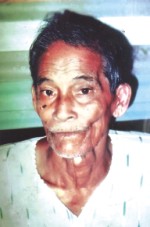Reflections
Memories of a Hero in Danger
Audity Falguni
 |
Abdus Shahid's wife, daughter and grand child. |
"I noticed through a quick glance that prison sentries were standing along with guns in their hands at all the 50 windows of the Khapra ward in Rajshahi prison. I tried to hide my face on the pillows and all on a sudden the rifles fired out. I saw blood splatter from the gate to the roof. Comrade Hanif, next to my bed, died instantly. So died Comrade Bijan Sen. Prison sentries then began to charge batons on us...the injured prison inmates who were arrested on political charge," writes journalist and political activist Abdus Shahid in his book 'Kara Smriti' ("Memoirs of the Prison''; first published on May 1977) about the killings of seven communist leaders in the Khapra Ward of Rajshahi jail.
Born in Chakhar Upazila of Barisal in 1917, late journalist, writer and political activist Abdus Shahid lived a life of heroic sacrifice and austerity for his ideals and belief. Born to an aristocratic and religiously orthodox (peer) Muslim family and having university graduation, he omitted a number of lucrative jobs and devoted his life for democratic, secular and socialist ideals. He spent nine radiant years of his beaming youth (1948-1957) in prison, worked amidst the farmers in rural Bangladesh from 1958 to 1970 and participated in the glorious Liberation War of 1971.
 |
| Late Abdus Shahid |
He spent the rest of his life working as a schoolteacher and journalist in different newspapers and writing books. He, however, depleted most of his earnings in social work and publishing political writings. Late journalist, writer and freedom fighter Abdus Shahid built a two-storied house with the money obtained from the sale of his ancestral property in Barisal and bank loan amounting to fifteen-lakh taka. Unfortunately enough, his 'poor' abode in 58/1, Ulan, Rampura, adjacent to the Hatir Jheel area of Dhaka, now faces the wrath of bulldozers thanks to some measures taken by the last Caretaker government.
The house, located in a city suburb is the main source of income for his wife, three daughters and their husbands and one sick son. But, in 2008, an eviction notice was served on this helpless family in accordance with the `Hatirjheel Development Scheme' of the government. Red flags were hoisted on late Abdus Shahid's homestead for acquisition in future. Rajia Shahid, wife of the prison veteran, filed a writ petition with the High Court to withhold eviction. The High Court initially granted the writ petition up to 31st August 2009. Later Shahid's family appealed for further extension of the time period for three more months till 25th November of this year and High Court has approved it accordingly. Meanwhile, around 216 renowned editors, columnists and journalists have signed a joint statement to resist the eviction process of late Shahid's house. Students of Dhaka University formed a human chain and newspapers have published a number of articles and reports pleading the government to desist the eviction.
 |
| Shahid's daughter Zaya before their home. |
"Unfortunately enough my son Pavel has been suffering from depression over the years. He could not complete his university studies and has not been able to work. My elder daughter Tania has joined a bank but all her salary gets exhausted to pay the bank loan. Younger daughter Zaya is a housewife. My two sons-in-law have just started their businesses and yet to make any mark," Rajia has said.
"If the government evicts us now, where would we go? We have to pay the bank loan with the salary of my elder daughter and the little sums obtained from my son-in-law' income. We rent the rest of the house to meet our day-to-day expenditure. If we lose this last and least shelter, we would really be penniless," she says.
"You can see the narrow bamboo bridge that is needed to come to our house, the marshland full of water hyacinth and all other hazards and obstacles in our everyday life. Still, this house is our lone recourse. As now a politically elected government has come to power, we urge the government through to protect this last memory of the country's one of the greatest heroes," Zaya Shahid, the younger daughter of the late leader, says.
Copyright
(R) thedailystar.net 2009 |
